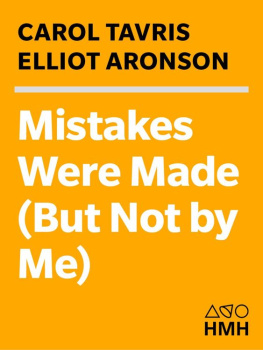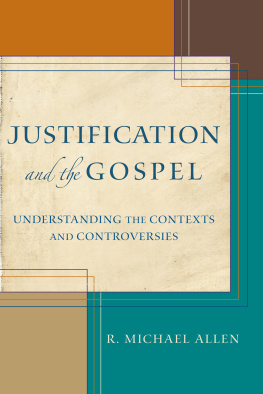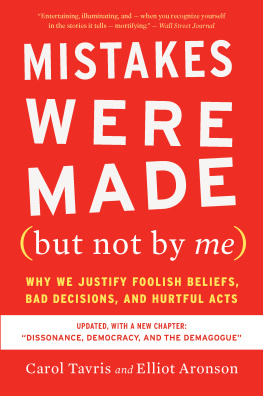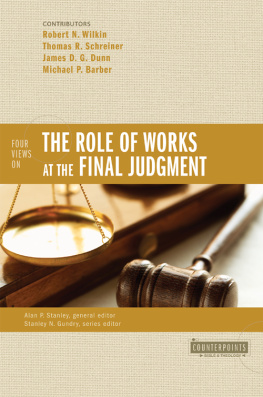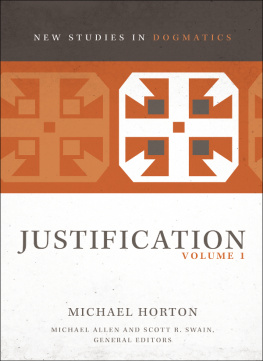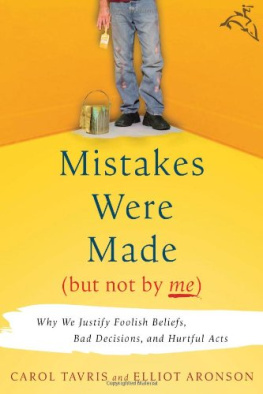
Table of Contents
Copyright 2007 by Carol Tavris and Elliot Aronson
All rights reserved. No part of this publication may be reproduced or transmitted in any form or by any means, electronic or mechanical, including photocopy, recording, or any information storage and retrieval system, without permission in writing from the publisher.
For information about permission to reproduce selections from this book, write to Permissions, Houghton Mifflin Harcourt Publishing Company, 215 Park Avenue South, New York, New York 10003.
www.hmhco.com
Frank and Debra extract from Andrew Christensen and Neil S. Jacobsons ReconcilableDifferences is 2000 Guilford Press and is reprinted with permission of Guilford Press.
The Library of Congress has cataloged the print edition as follows:
Tavris, Carol.
Mistakes were made (but not by me): why we justify foolish beliefs, bad decisions, and hurtful acts/Carol Tavris & Elliot Aronson.1st ed.
p. cm.
Includes bibliographical references and index.
1. Cognitive dissonance. 2. Self-deception. I. Aronson, Elliot. II. Title.
BF337.C63T38 2007
153dc22 2006026953
ISBN 978-0-15-101098-1
eISBN 978-0-547-41603-8
v2.0114
To Ronan, my Wonderful O
Carol Tavris
To Vera, of course
Elliot Aronson
We are all capable of believing things which we know to be untrue, and then, when we are finally proved wrong, impudently twisting the facts so as to show that we were right. Intellectually, it is possible to carry on this process for an indefinite time: the only check on it is that sooner or later a false belief bumps up against solid reality, usually on a battlefield.
George Orwell (1946)
A great nation is like a great man:
When he makes a mistake, he realizes it.
Having realized it, he admits it.
Having admitted it, he corrects it.
He considers those who point out his faults as his most benevolent teachers.
Lao Tzu
Introduction
Knaves, Fools, Villains, and Hypocrites: How Do They Live with Themselves?
Mistakes were quite possibly made by the administrations in which I served.
Henry Kissinger, responding to charges that he committed war crimes in his role in the United States actions in Vietnam, Cambodia, and South America in the 1970s
If, in hindsight, we also discover that mistakes may have been made... I am deeply sorry.
Cardinal Edward Egan of New York, referring to the bishops who failed to deal with child molesters among the Catholic clergy
Mistakes were made in communicating to the public and customers about the ingredients in our French fries and hash browns.
McDonalds, apologizing to Hindus and other vegetarians for failing to inform them that the natural flavoring in their potatoes contained beef byproducts
This weeks question: How can you tell when a presidential scandal is serious?
A. The presidents poll numbers drop.
B. The press goes after him.
C. The opposition calls for his impeachment.
D. His own party members turn on him.
E. Or the White House says, mistakes were made.
Bill Schneider on CNNs Inside Politics
AS FALLIBLE HUMAN BEINGS, all of us share the impulse to justify ourselves and avoid taking responsibility for any actions that turn out to be harmful, immoral, or stupid. Most of us will never be in a position to make decisions affecting the lives and deaths of millions of people, but whether the consequences of our mistakes are trivial or tragic, on a small scale or a national canvas, most of us find it difficult, if not impossible, to say, I was wrong; I made a terrible mistake. The higher the stakesemotional, financial, moralthe greater the difficulty.
It goes further than that: Most people, when directly confronted by evidence that they are wrong, do not change their point of view or course of action but justify it even more tenaciously. Even irrefutable evidence is rarely enough to pierce the mental armor of self-justification. When we began working on this book, the poster boy for tenacious clinging to a discredited belief was George W. Bush. Bush was wrong in his claim that Saddam Hussein had weapons of mass destruction, he was wrong in claiming that Saddam was linked with Al Qaeda, he was wrong in predicting that Iraqis would be dancing joyfully in the streets to receive the American soldiers, he was wrong in predicting that the conflict would be over quickly, he was wrong in his gross underestimate of the financial cost of the war, and he was most famously wrong in his photo-op speech six weeks after the invasion began, when he announced (under a banner reading MISSION ACCOMPLISHED ) that major combat operations in Iraq have ended.
Of course, Bush had to justify the war his administration pursued in Iraq; he had too much invested in that course of action to do otherwisethousands of deaths and, according to a conservative estimate from the American Enterprise Institute in 2006, at least a trillion dollars. Accordingly, when he was proved wrong in his original reasons for the war, he found new ones: getting rid of a very bad guy, fighting terrorists, promoting peace in the Middle East, bringing democracy to Iraq, increasing the security of the United States, and finishing the task [our troops] gave their lives for. In other words, we must continue the war because we began the war.
Politicians are the most visible of self-justifiers, which is why they provide such juicy examples. They have refined the art of speaking in the passive voice; when their backs are to the wall they will reluctantly acknowledge error, but not responsibility. Oh all right, mistakes were made, but not by me; by someone else, who shall remain nameless. When Henry Kissinger said that the administration may have made mistakes, he was sidestepping the fact that as national security adviser and secretary of state (simultaneously) he, in effect, was the administration. This self-justification allowed him to accept the Nobel Peace Prize with a straight face and a clear conscience.
We look at the behavior of politicians with amusement or alarm or horror, but, psychologically, what they do is no different in kind, though certainly in consequence, from what most of us have done at one time or another in our private lives. We stay in an unhappy relationship or merely one that is going nowhere because, after all, we invested so much time in making it work. We stay in a deadening job way too long because we look for all the reasons to justify staying and are unable to clearly assess the benefits of leaving. We buy a lemon of a car because it looks gorgeous, spend thousands of dollars to keep the damn thing running, and then we spend even more to justify that investment. We self-righteously create a rift with a friend or relative over some real or imagined slight, yet see ourselves as the pursuers of peaceif only the other side would apologize and make amends.
Self-justification is not the same thing as lying or making excuses. Obviously, people will lie or invent fanciful stories to duck the fury of a lover, parent, or employer; to keep from being sued or sent to prison; to avoid losing face; to avoid losing a job; to stay in power. But there is a big difference between what a guilty man says to the public to convince them of something he knows is untrue (I did not have sex with that woman; I am not a crook), and the process of persuading himself that he did a good thing. In the former situation, he is lying and knows he is lying to save his own skin. In the latter, he is lying to himself. That is why self-justification is more powerful and more dangerous than the explicit lie. It allows people to convince themselves that what they did was the best thing they could have done. In fact, come to think of it, it was the right thing. There was nothing else I could have done. Actually, it was a brilliant solution to the problem. I was doing the best for the nation. Those bastards deserved what they got. Im entitled.
Next page
